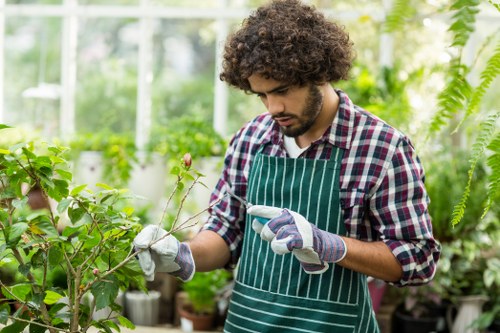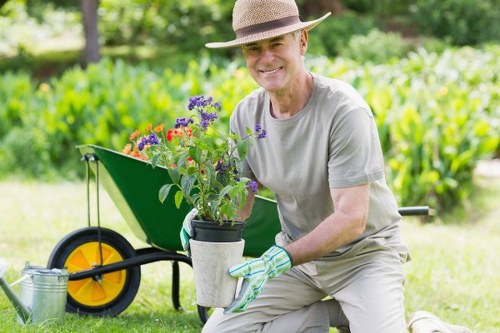Comprehensive Guide to Garden Maintenance in Woolwich
Introduction to Garden Maintenance

Maintaining a beautiful garden requires dedication, knowledge, and the right set of tools. In Woolwich, where the climate and soil conditions can vary, understanding the local environment is crucial for successful garden upkeep. Whether you're a seasoned gardener or a beginner, this guide will provide you with essential tips and strategies to keep your garden thriving year-round.
Garden maintenance encompasses a range of activities, from planting and pruning to pest control and soil management. Each of these tasks plays a vital role in ensuring that your garden remains healthy and aesthetically pleasing. By following a structured maintenance routine, you can prevent common issues and promote the long-term sustainability of your garden.
In Woolwich, the mild climate allows for a diverse range of plants to flourish. However, the unique soil composition and local pests require gardeners to adopt specific practices tailored to the region. This guide will delve into the best practices for garden maintenance in Woolwich, providing you with the knowledge needed to cultivate a vibrant and resilient garden.
Understanding the Climate and Soil in Woolwich

Woolwich enjoys a temperate maritime climate, characterized by mild winters and warm summers. This climate is conducive to growing a wide variety of plants, including perennials, annuals, shrubs, and trees. However, gardeners must be mindful of seasonal changes to optimize plant health and growth.
The soil in Woolwich is predominantly sandy with varying levels of clay and silt. Sandy soils drain well but may not retain nutrients as effectively as heavier soils. To enhance soil fertility, it is essential to incorporate organic matter such as compost or well-rotted manure. Regular soil testing can help determine nutrient deficiencies and guide appropriate amendments.
Understanding the interplay between climate and soil is fundamental to successful garden maintenance. By selecting plants that are well-suited to Woolwich's conditions and amending the soil to meet their needs, gardeners can create a robust foundation for their garden's success.
Plant Selection and Placement

Choosing the right plants is the cornerstone of a thriving garden. In Woolwich, it's important to select species that are adapted to the local climate and soil conditions. Native plants are often a good choice, as they are more resilient and require less maintenance.
Consider the following factors when selecting plants:
- Climate Compatibility: Ensure the plant can withstand the temperature ranges and precipitation patterns of Woolwich.
- Soil Requirements: Match plants to the soil type, whether it's sandy, clay-rich, or loamy.
- Sunlight Exposure: Place sun-loving plants in areas with ample sunlight and shade-tolerant varieties in more shaded spots.
- Water Needs: Group plants with similar watering requirements together to streamline irrigation efforts.
Proper placement not only enhances the visual appeal of your garden but also promotes healthy growth by ensuring that each plant receives the appropriate conditions.
Seasonal Garden Maintenance Tasks

Spring Maintenance
Spring is a critical time for garden maintenance. As the weather warms, plants begin to emerge from dormancy, and it's important to prepare the garden for the growing season.
Key spring tasks include:
- Pruning: Trim dead or damaged branches to encourage healthy growth.
- Soil Preparation: Add compost and other organic matter to enrich the soil.
- Planting: Sow seeds and transplant seedlings to establish new plants.
- Weed Control: Remove weeds early to prevent them from competing with your plants.
Summer Maintenance
The summer months require diligent care to ensure that plants remain healthy despite the heat and potential dryness.
Summer tasks include:
- Watering: Implement a consistent watering schedule, preferably in the early morning.
- Pest Management: Monitor for pests and treat infestations promptly.
- Mulching: Apply mulch to retain soil moisture and suppress weeds.
- Deadheading: Remove spent flowers to encourage continuous blooming.
Autumn Maintenance
Autumn is the time to prepare your garden for the winter months. Proper maintenance now can lead to a more vibrant garden in the spring.
Autumn tasks include:
- Leaf Removal: Clear fallen leaves to prevent fungal diseases.
- Planting Bulbs: Sow spring-blooming bulbs for early color next year.
- Soil Amendment: Incorporate organic matter to enhance soil structure.
- Pruning: Trim back perennials and cut trees as needed.
Winter Maintenance
While much of the garden may be dormant, winter is still a time for upkeep and preparation.
Winter tasks include:
- Tool Maintenance: Clean and sharpen gardening tools for the upcoming season.
- Protecting Plants: Use frost blankets or other methods to shield sensitive plants.
- Planning: Assess garden performance and plan for improvements in the next year.
Pest and Disease Management

Common Garden Pests in Woolwich
Pests can pose a significant threat to garden health. In Woolwich, some of the most common pests include aphids, slugs, snails, and caterpillars. Identifying these pests early and implementing control measures is essential to prevent extensive damage.
Effective Pest Control Strategies
- Biological Control: Introduce natural predators such as ladybugs to control aphid populations.
- Cultural Practices: Rotate crops and maintain plant diversity to disrupt pest life cycles.
- Mechanical Control: Handpick pests or use barriers like copper tape to deter slugs and snails.
- Chemical Control: Use pesticides as a last resort, choosing environmentally friendly options when possible.
Managing Plant Diseases
Diseases such as powdery mildew, root rot, and bacterial wilt can affect garden plants. Preventative measures, including proper spacing, adequate watering, and resistant plant varieties, are crucial in managing these issues.
Preventative Tips:
- Good Air Circulation: Ensure plants are not overcrowded to allow for proper airflow.
- Watering Techniques: Water at the base of plants to keep foliage dry.
- Sanitation: Remove and dispose of diseased plant material promptly.
Soil Health and Fertility
Soil Testing and Analysis
Regular soil testing provides valuable insights into the nutrient composition and pH levels of your garden soil. Understanding these factors allows you to tailor your soil management practices to meet the specific needs of your plants.
Amending the Soil
Based on soil test results, you may need to adjust the soil to improve fertility and structure.
- Adding Compost: Enhances soil structure and provides a slow-release source of nutrients.
- Lime or Sulfur: Adjusts soil pH to optimal levels for plant growth.
- Organic Fertilizers: Provide essential nutrients in a natural form.
Maintaining Soil Health
Healthy soil is the foundation of a thriving garden. Practices such as crop rotation, cover cropping, and minimal tillage help maintain soil structure and prevent nutrient depletion.
Cover Crops: Planting cover crops like clover or rye can prevent soil erosion and add organic matter.
Mulching: Applying mulch conserves moisture, regulates soil temperature, and adds organic material as it decomposes.
Irrigation and Water Management
Efficient Watering Techniques
Proper irrigation is essential for plant health, especially during the warmer months. Overwatering can lead to root diseases, while underwatering stresses plants and inhibits growth.
- Drip Irrigation: Delivers water directly to the plant roots, reducing waste and minimizing evaporation.
- Soaker Hoses: Provide a slow and steady supply of water, ideal for garden beds.
- Rain Barrels: Collect rainwater for garden use, promoting sustainable water practices.
Water Conservation Tips
Conserving water not only benefits the environment but also reduces water bills.
- Mulching: Retains soil moisture and reduces the need for frequent watering.
- Drought-Resistant Plants: Choose plants that require less water to thrive.
- Scheduled Watering: Water plants during the early morning or late evening to minimize evaporation.
Dealing with Waterlogged Soil
Poor drainage can lead to waterlogged conditions, which are detrimental to plant roots. To improve drainage:
- Amend Soil: Incorporate sand or compost to enhance soil structure.
- Elevated Beds: Build raised garden beds to facilitate better water runoff.
- Drainage Systems: Install French drains or other drainage solutions in areas prone to excess water.
Lawn Care and Maintenance
Regular Mowing
Maintaining a well-manicured lawn enhances the overall appearance of your garden. Regular mowing encourages dense and healthy grass growth.
- Mow at the Right Height: Different grass types have optimal mowing heights; ensure you're cutting at the recommended level.
- Sharp Blades: Keep mower blades sharp to make clean cuts and prevent grass damage.
- Frequency: Mow frequently enough to avoid removing more than one-third of the grass blade at a time.
Fertilizing Your Lawn
Fertilizing provides essential nutrients that promote healthy grass growth.
- Choose the Right Fertilizer: Select a fertilizer that matches your grass type and soil needs.
- Application Timing: Apply fertilizer during the growing season for maximum benefit.
- Proper Application: Follow recommended application rates to avoid over-fertilization.
Weed and Pest Control
Weeds compete with grass for nutrients and water, while pests can damage your lawn.
- Pre-Emergent Herbicides: Prevent weed seeds from germinating.
- Manual Weeding: Remove weeds by hand to control them without chemicals.
- Lawn Pests: Monitor for pests like grubs and treat infestations promptly.
Hardscape Maintenance
Pathways and Patios
The hardscape elements of your garden, such as pathways and patios, require regular maintenance to stay functional and attractive.
- Weed Control: Keep cracks and joints free of weeds to prevent overgrowth.
- Cleaning: Sweep and wash hardscape surfaces to remove dirt and debris.
- Repairs: Address any damage promptly to maintain safety and aesthetics.
Fencing and Garden Structures
Fences, pergolas, and other garden structures add character but also need upkeep.
- Inspect for Damage: Regularly check for loose boards, rust, or other signs of wear.
- Painting and Sealing: Protect wooden structures from the elements with appropriate treatments.
- Maintenance: Ensure that all components are secure and functioning as intended.
Water Features
If your garden includes water features like fountains or ponds, they require specific maintenance to keep the water clean and the features operational.
- Cleaning: Remove algae and debris regularly to maintain water clarity.
- Pump Maintenance: Ensure that pumps and other mechanical components are functioning properly.
- Chemical Balance: Test and adjust water chemistry to prevent issues like algae blooms.
Garden Tools and Equipment
Essential Tools for Garden Maintenance
Having the right tools is essential for efficient garden maintenance. Invest in quality tools that will last and make your gardening tasks easier.
- Pruners and Shears: For trimming and shaping plants.
- Shovels and Spades: For digging and soil management.
- Rakes: For leveling soil and removing debris.
- Hoses and Irrigation Systems: For effective watering.
- Wheelbarrows: For transporting soil, plants, and other materials.
Maintaining Garden Tools
Proper maintenance extends the life of your garden tools and ensures they perform effectively.
- Cleaning: Remove dirt and debris after each use.
- Sharpening: Keep blades sharp for precise cutting.
- Storage: Store tools in a dry place to prevent rust and damage.
- Repairs: Address any damage promptly to avoid further deterioration.
Upgrading Your Equipment
As your gardening needs evolve, you may find it beneficial to upgrade to more advanced tools and equipment.
- Ergonomic Designs: Reduce strain and increase comfort during prolonged use.
- Electric or Battery-Powered Tools: Improve efficiency and ease of use.
- Specialized Tools: Invest in tools designed for specific tasks to enhance productivity.
Sustainability in Garden Maintenance
Organic Gardening Practices
Adopting organic gardening practices promotes environmental sustainability and reduces reliance on chemical inputs.
- Composting: Recycle kitchen and garden waste into nutrient-rich compost.
- Natural Pest Control: Use beneficial insects and organic pesticides to manage pests.
- Organic Fertilizers: Opt for natural fertilizers like bone meal and fish emulsion.
Water Conservation Techniques
Conserving water is not only environmentally responsible but also cost-effective.
- Rainwater Harvesting: Collect and utilize rainwater for irrigation.
- Drought-Tolerant Plants: Choose plants that require minimal watering.
- Efficient Irrigation Systems: Implement drip irrigation or soaker hoses to minimize water waste.
Reducing Chemical Use
Minimizing the use of chemical fertilizers and pesticides benefits both the environment and your garden's health.
- Integrated Pest Management (IPM): Combine biological, cultural, and mechanical controls for effective pest management.
- Natural Amendments: Use organic soil amendments to improve fertility without chemicals.
- Mulching: Suppress weeds and retain moisture without the need for chemical herbicides.
Professional Garden Maintenance Services in Woolwich
Benefits of Hiring Professionals
While DIY garden maintenance can be rewarding, hiring professional gardeners in Woolwich offers several advantages.
- Expertise: Professionals bring specialized knowledge of local conditions and best practices.
- Time-Saving: Outsourcing maintenance tasks frees up your time for other pursuits.
- Quality Results: Experienced gardeners ensure high standards of maintenance and plant care.
Services Offered by Garden Maintenance Companies
Professional garden maintenance services in Woolwich typically include:
- Lawn Care: Mowing, fertilizing, aeration, and pest control.
- Pruning and Trimming: Shaping shrubs, trees, and hedges for health and aesthetics.
- Planting and Mulching: Installing new plants and applying mulch for moisture retention and weed suppression.
- Weed and Pest Management: Implementing strategies to control unwanted plants and pests.
- Seasonal Cleanup: Preparing the garden for changing seasons with tasks like leaf removal and soil amendment.
Choosing the Right Service Provider
Selecting a reputable garden maintenance company ensures that your garden receives the best possible care.
- Experience: Look for companies with a proven track record in Woolwich.
- Reviews and Testimonials: Check feedback from previous clients to gauge service quality.
- Services Offered: Ensure the company provides the specific services you need.
- Pricing: Compare quotes to find a service that fits your budget.
What to Expect from a Professional Service
A professional garden maintenance service will typically conduct an initial assessment of your garden, discuss your preferences and requirements, and develop a tailored maintenance plan. Regular visits and open communication ensure that your garden remains in optimal condition.
Contact us today to learn more about how our professional garden maintenance services in Woolwich can transform your outdoor space.
DIY Garden Maintenance Tips
Creating a Maintenance Schedule
Establishing a regular maintenance schedule helps keep your garden organized and ensures that no tasks are overlooked.
- Daily Tasks: Quick inspections, watering as needed.
- Weekly Tasks: Mowing, weeding, pruning.
- Monthly Tasks: Fertilizing, soil testing, detailed cleaning.
- Seasonal Tasks: Preparing for planting seasons, major cleanups.
Basic Gardening Techniques
Mastering fundamental gardening techniques enhances your ability to maintain your garden effectively.
Proper Watering
Watering deeply and less frequently encourages deep root growth. Avoid shallow, frequent watering which can lead to weak roots and increased susceptibility to drought.
Pruning and Trimming
Regular pruning promotes healthy growth and prevents overgrowth. Focus on removing dead or diseased branches and shaping plants to their desired form.
Weed Control
Consistently removing weeds prevents them from competing with your plants for resources. Use mulch, hand-pulling, or natural herbicides to manage weed growth.
Using Organic Amendments
Incorporating organic amendments like compost and manure improves soil health and provides essential nutrients to your plants.
- Composting: Create a compost pile with kitchen scraps and garden waste to produce rich, organic matter.
- Green Manures: Grow cover crops that can be tilled into the soil to add nutrients and improve structure.
- Mulching: Apply organic mulch to retain moisture, suppress weeds, and gradually enrich the soil as it breaks down.
Book your service now to take advantage of our expert tips and ensure your garden in Woolwich remains lush and vibrant.
Landscape Design and Enhancements
Incorporating Hardscape Elements
Integrating hardscape elements like patios, walkways, and garden beds enhances the functionality and visual appeal of your garden.
- Patios: Provide a space for outdoor seating and entertaining.
- Walkways: Guide visitors through the garden and protect plant beds.
- Garden Beds: Define planting areas and add structure to the landscape.
Adding Water Features
Water features such as ponds, fountains, and streams add a tranquil element to your garden, attracting wildlife and creating a soothing ambiance.
- Ponds: Support aquatic plants and provide habitat for beneficial insects.
- Fountains: Offer the sound of flowing water and visual interest.
- Bird Baths: Invite birds to your garden, enhancing biodiversity.
Creating Biodiversity
Promoting biodiversity in your garden attracts beneficial insects and wildlife, contributing to a balanced ecosystem.
- Native Plants: Support local wildlife by planting species native to Woolwich.
- Pollinator Gardens: Grow flowers that attract bees, butterflies, and other pollinators.
- Wildlife Habitats: Incorporate features like birdhouses, bat boxes, and insect hotels to encourage diverse species.
Lighting and Decoration
Outdoor lighting and decorative elements enhance the beauty and functionality of your garden, especially during evening hours.
- Pathway Lighting: Illuminate walkways for safety and aesthetic appeal.
- Accent Lighting: Highlight focal points like trees, sculptures, or water features.
- Decorative Features: Add garden ornaments, sculptures, or art pieces to personalize your space.
Conclusion
Maintaining a Beautiful Garden in Woolwich
Effective garden maintenance in Woolwich involves understanding the local climate and soil, selecting appropriate plants, and implementing a structured maintenance routine. By integrating sustainable practices and, if necessary, enlisting professional help, you can ensure that your garden remains a vibrant and enjoyable space throughout the year.
Whether you're tending to a small urban garden or a sprawling backyard, the principles outlined in this guide provide a foundation for successful garden maintenance. Stay committed to regular upkeep, stay informed about best practices, and enjoy the rewards of a flourishing garden in Woolwich.
Contact us today to start your journey towards a beautifully maintained garden that enhances your outdoor living experience.

